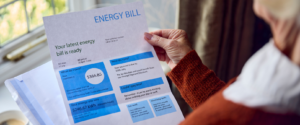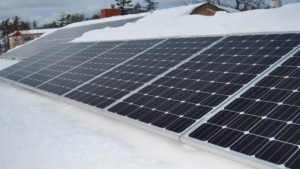Over the last 15 years, issues in the energy and rail sectors have been inherently linked. With the UK government’s net-zero emissions target looming, power constraints and the rising cost of electricity have given climate-conscious commuters cause for concern.In 2015, the government slashed grants vital to the work of renewable energy charities, a decision that has since been highly criticised.By cutting climate policies (including scrapping plans to make homes ‘carbon neutral’ via solar generation) and excluding solar energy from government support, it’s suspected these cuts are costing the average UK household £40-£60 per year in energy bills.At the same time, Network Rail’s attempts to electrify the UK’s train tracks have fallen short. To meet net-zero commitments, the transport body has been attempting to phase out diesel trains in favour of environmentally friendly electric trains.However, progress has stalled. With Network Rail failing to reach their electrification target (448 km per year) for at least a decade, it appears the net-zero goal won’t be achieved until at least 2090.That’s why, in recent years, renewable energy experts have collaborated with Network Rail to find a cross-sector solution.
What are solar-powered trains?
The plan for solar-powered trains involves placing photovoltaic panels along the railway network rather than on the trains themselves.The generated electricity from the solar panels would then be fed into high voltage systems that supply direct current (DC) electricity to rail traction substations; this connection would allow the solar energy to be directly used for powering the trains.
The timeline of solar-powered trains
But when were these plans first proposed? Who took the first steps towards solar-powered trains, and are they a reality in 2023?
2017
In 2017, social enterprise Riding Sunbeam, Network Rail and climate change charity 10:10 formed a partnership. The pilot scheme, ‘First Light’, used repurposed rail equipment and photovoltaic systems to trial the UK’s first solar-powered trains.Placing their focus on six areas in southeast England, the trials aimed to determine the feasibility of pilot solar traction farms. However, First Light faced significant challenges. One of the main issues was the lack of existing equipment to test the solar panels in a railway context.They found that developing new equipment for railway applications is a complex and expensive process. It took 18 months before First Light secured funds of £350,000 from Innovate UK to get the project off the ground.
2019
July 2019 saw First Light launch its solar-powered train prototype. As a pilot study, the project used 100 solar panels with a total output under 40kW and used this data to determine ‘how to plug in much larger solar arrays to power trains in future’.
2020
Riding Sunbeam, Network Rail, and 10:10’s collaboration proved successful, with the First Light project securing a £2.5 million grant from the South East Local Enterprise Partnership’s share of the UK government’s Getting Building Fund.This commercial funding was a big win: the £2.5 million was allocated to build and connect the world’s first megawatt (MW) scale renewable solar energy plant directly powering the railways, specifically in East Sussex.
Early 2022
Riding Sunshine allocated a portion of its funds to developing a solar-powered railway line connecting Eastbourne and London, known as the ‘Cuckmere Community Solar Farm’.In partnership with Network Rail, the transport body estimates that solar could provide 10% of the energy needed for its trains, primarily in southeast England.Following completion, Cuckmere Community Solar planned to launch an investment offer, allowing local community members and rail commuters to own a part of the project.
Late 2022
Riding Sunshine and Network Rail’s collaboration saw even greater success in late 2022 when the HS1 railway link (connecting London to the Channel Tunnel) became the UK’s first train line to run entirely on renewable energy!Using a combination of wind and solar panel energy, the HS1 line now focuses on reducing the carbon footprint per passenger by 25% and energy per train journey by 10%.
What’s happening in 2023?
The renewable energy sector and the rail industry have made significant collaborative strides since 2017.In 2023, climate charity 10:10 and researchers from the Imperial College of London continue to work, exploring how using track-side solar panels to power trains could significantly contribute to the rail sector’s decarbonisation agenda.Their approach to incorporating solar power into the railway network is novel: the study aims to connect solar panels directly to the train lines, bypassing the traditional electricity grid. As of December 2023, the project is expected to be manufactured and completed in 2024.Equally exciting is the collaboration between Siemens Mobility (a sustainable railway company), British Solar Renewables and researchers at the University of York.Deemed a ‘first of its kind’ project, this partnership focuses on overcoming the technical challenges that have hindered the use of renewable energy to power 25kV trains.As much of the UK’s railway network is not yet electrified, they’re also exploring the feasibility of introducing a charging station that can charge on-train batteries.This development aims to create ‘green routes’ where trains can be powered by batteries or electricity, depending on their location in the network. The successful implementation of this project would allow for the nationwide phasing out of diesel trains, a goal that would take the UK closer to its net-zero goal.
Jump on the “Renewable Energy” Train
Through years of research and development, renewable energy experts have spearheaded the progress of solar-powered trains. In 2022, the UK saw its first entirely renewable energy-powered train: a milestone that may have seemed unattainable 10 years ago.Today, research continues. With plenty of innovative projects on the horizon and others launching test pilots, we’ll likely see more solar-powered trains in the UK in the near future. Play your own part in the eco-revolution by contacting Project Solar today.


